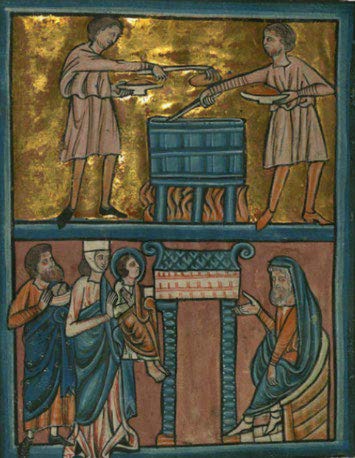Sermon 1/17/2021 “Loyalties and priorities”
Preacher: Jo J. Belser
Location: Church of the Resurrection at VTS in Alexandria, VA
Text: 1 Samuel 3:1-20
Day: 2Epiphany, Year B, during a pandemic

When I was a teenager, a minister I knew was prohibited from pastoring for a time. His offense? He knew that his teenaged sons were drinking beer and smoking marijuana in the church building, using the offering plates for ashtrays, and he hadn’t stopped them. The charge was desecration of the church, but the real offense was misplaced loyalties and poor priorities in honoring his children over God.
I thought of this incident when I read our first lesson for today. In our lesson, Eli also was in trouble because his sons were misbehaving in the Lord’s house. In the words of scripture, “… [Eli’s] sons were blaspheming God, and he did not restrain them.” Eli had misplaced loyalties and poor priorities.
Eli was 98 years old and going blind. However, he was of great importance, given that he was High Priest of Shiloh, where the House of the Lord was before Solomon much later built the Temple in Jerusalem. Eli was also a judge of the people. He followed Samson and was the next-to-last judge before kings began to rule the land. But as importantly, perhaps, Eli was probably the great-grandson of the Moses.
We can debate that claim another time. However, as High Priest, Eli was responsible for all that occurred in the Lord’s house, even the misdeeds of his sons, who also were priests. But Eli’s sons weren’t simply desecrating the church. Instead, they were sleeping with the temple’s servant girls, eating the Lord’s portion of the sacrificial meat, and using force to extort giving.

Eli wasn’t misbehaving and he hadn’t ignored the situation; he had chastised his sons, but they persisted, and Eli hadn’t taken further steps against them. Presumably, Eli would have mustered the wherewithal to have dealt with the situation better, were the offenders not his own sons. Or maybe not; Eli was old and going blind. However, Eli was not removed from his post by God for being old, or for his failing eyesight. Instead, God wanted to replace Eli with the boy Samuel because Eli was allowing desecration of the Temple, showing his misplaced loyalties and poor priorities.
So, how did God go about recruiting a replacement for the great Eli? We first hear about Eli in the Bible in the year 1252 Before the Common Era. At that time, as High Priest, he assured the childless Hannah that she would have a child. Hannah consequently gave birth to Samuel, her first-born child. Fulfilling her promise to God, she took Samuel to the Temple and dedicated him to the Lord, giving him to Eli to raise. So, Eli was adopted by Samuel, sort of, and he had two other sons. The Bible says the other two sons of Eli didn’t know God, but they were “the sons of Belial.”
I thought that Belial was the name of a woman who was wife of Eli. But I discovered this week that Belial is not the name of a specific person, but the generic name for the spirit of evil, someone who is reckless, worthless, and lawless. Someone with misplaced loyalties and poor priorities in relation to God.
In Hebrew scripture, Belial is someone with a “wicked heart.” In Deuteronomy 15:9, for instance, Belial is someone who does not forgive the debts of others in the seventh, or jubilee, year. So, those who ignore the needy are “Belial,” and those who live only for themselves are Belial.
In our first lesson today, Eli’s sons were serving as God’s priests in God’s temple, but they were not doing God’s work. However, Samuel was obedient to God. And God gave Samuel the task of telling Eli that God was supplanting him and his descendants from being priests. Notice here how long the work of God was in placing a suitable replacement for Eli into position.
Eli took the news very well. However, both of his sons were soon killed by the Philistines trying unsuccessfully to defend the Ark of the Covenant in battle. When Eli heard about the loss of the Ark, he fell over backwards and—being a very large man—the fall killed him. I have always marveled at Eli’s faithfulness: He didn’t topple over when his sons were killed, but only after the Ark was lost.
Samuel subsequently became High Priest, the last Judge of Israel, and a prophet. He anointed the first two kings of Israel. And, as our lesson says, “God was with him.”
So, what lessons shall we take from this lesson today?
First, I acknowledge that—despite our best efforts—our children do not always choose God as we have chosen God. Take some comfort in the words of Ezekiel (18:20), “The son shall not bear the iniquity of the father, neither shall the father bear the iniquity of the son.” Perhaps the greatest gift we can give those who do not choose God is to love them anyway and let God sort it all out. But take care, as Eli did not, to not honor your children over honoring the Lord.
What do I mean by that? Would you choose time with your family at the expense of time with God? Surely not. Would you totally disinherit the work of God in which you have invested your life to fully inherit your children and their children? Surely not. Today’s first lesson suggests we consider which of our loyalties should come first and to not let any of our loyalties preempt those we owe to God.
At this point, people in the very denomination that censured the minister I told you about at the start of this sermon would say to me, “Preacher, you’ve stopped preaching and gone to meddling.” Perhaps. But someone should have “meddled” in Eli’s choices.
Here’s the truly Good News about the story of Eli and Samuel. Eli did his best, most of the time. And Eli was a great man, God’s force for good to the end. And God is always working to bring someone unexpected, someone new, to continue the work begun in us when we reach our life’s end.
Some of you are no doubt relieved I didn’t overtly dip into politics today. Some of you no doubt would have preferred me to “go there.” But were you to listen again, you will hear that I have “gone there.” Take great care, amid the very real distractions of life, to not misplace your loyalties and make poor priorities. “Render unto Caesar that which is Caesar’s, and unto God, that which is God’s.”

